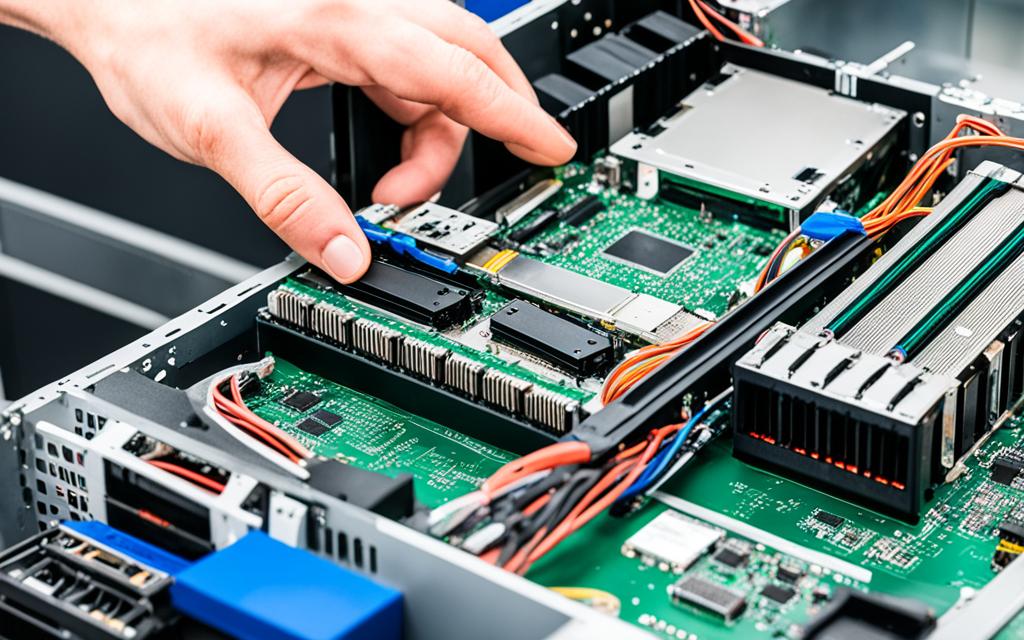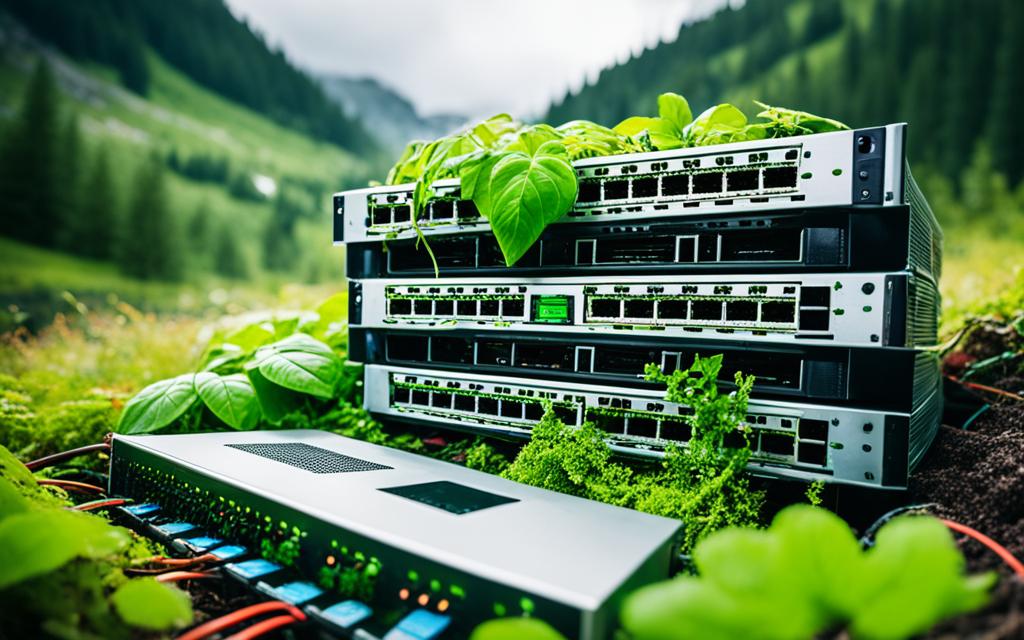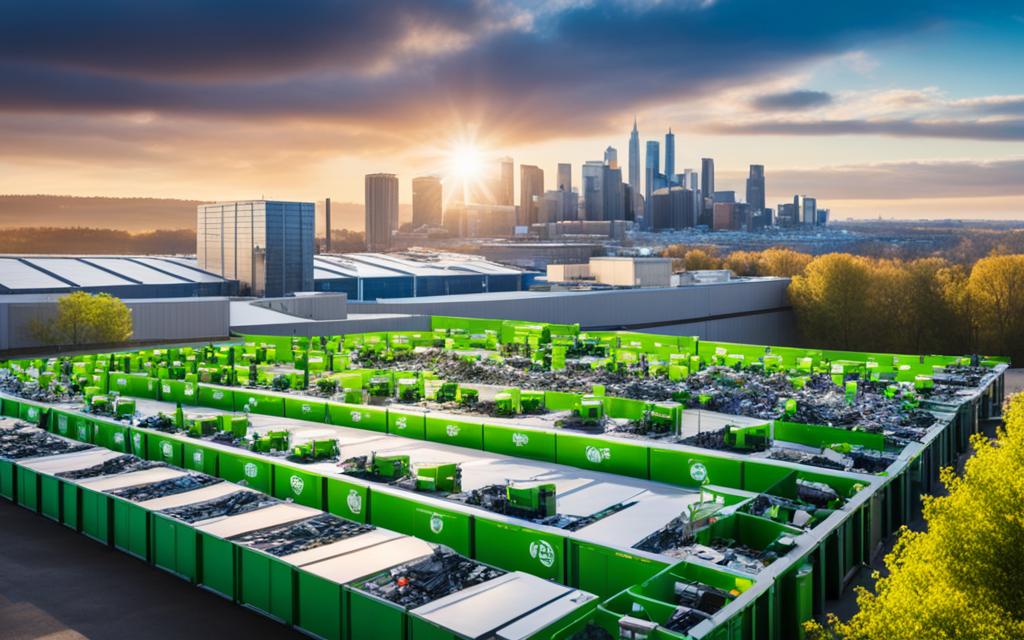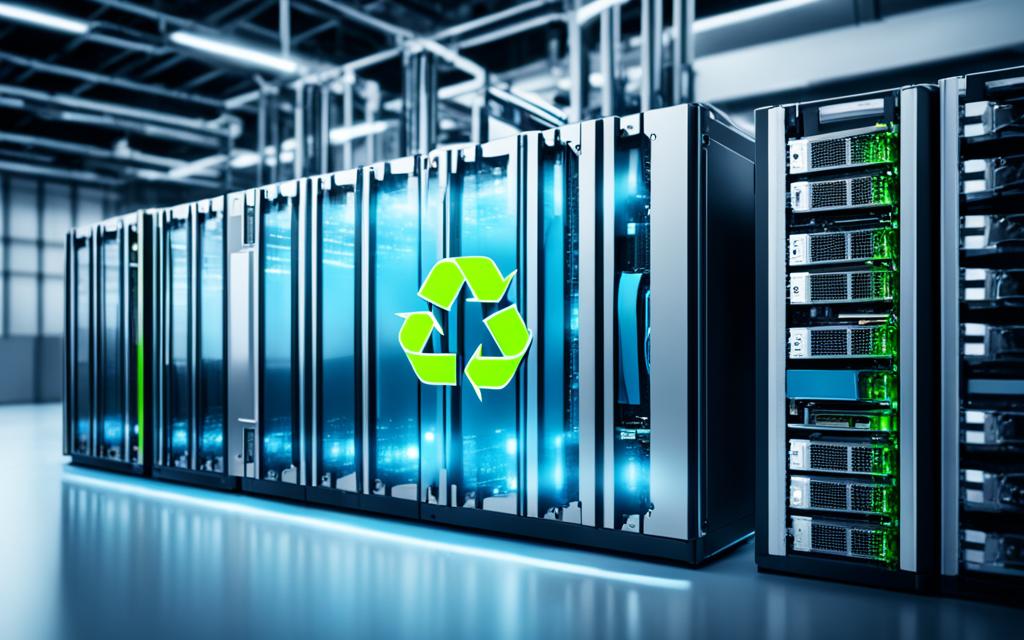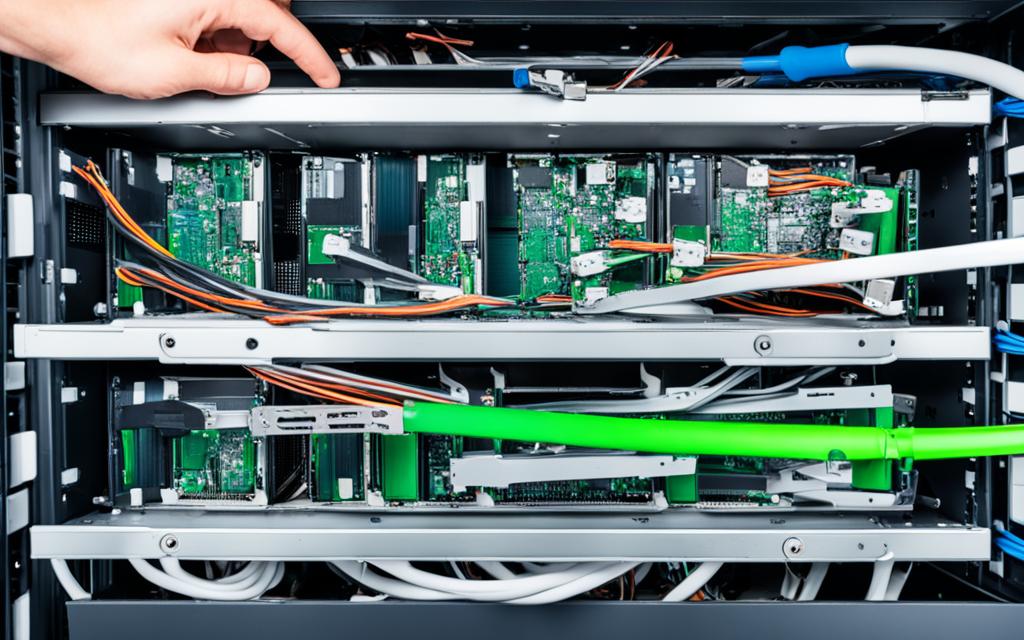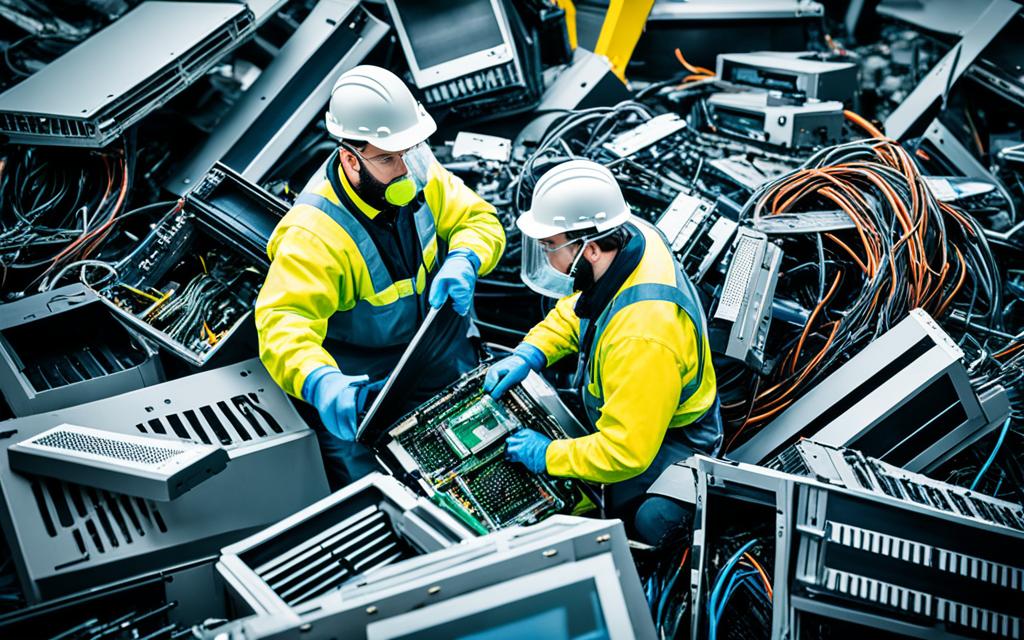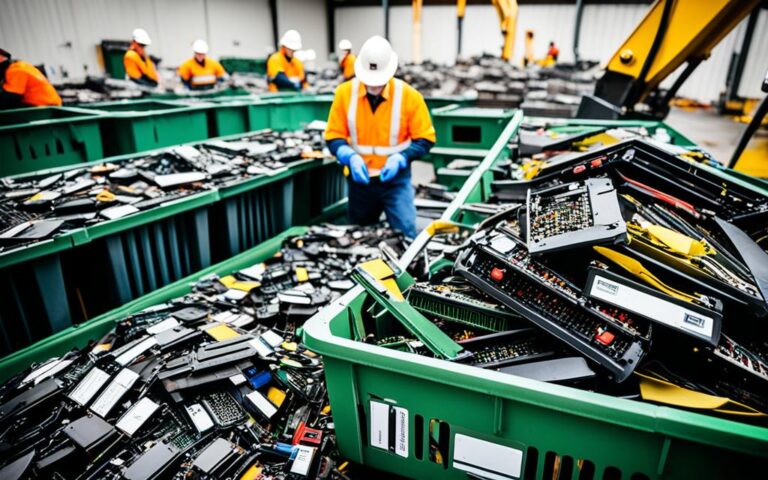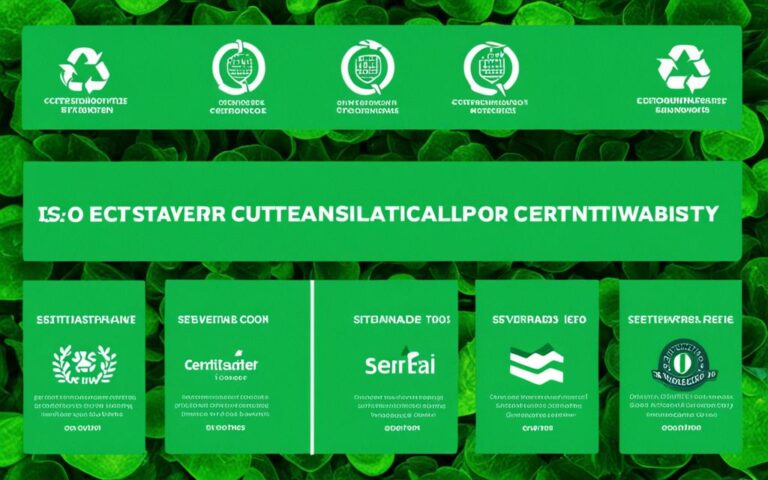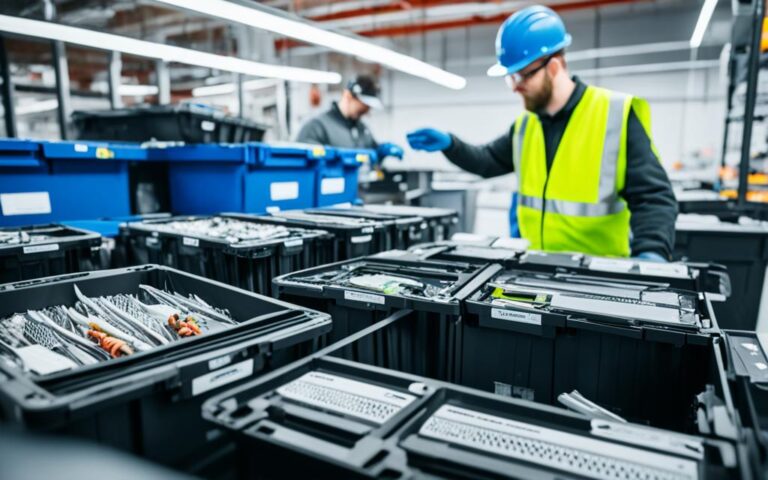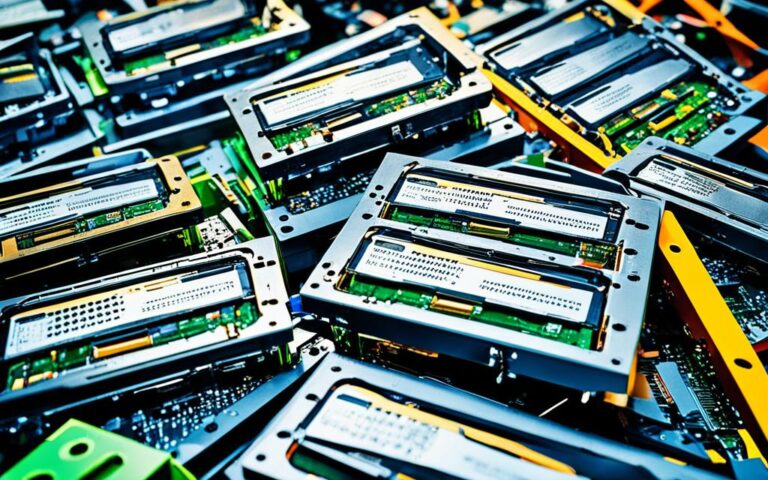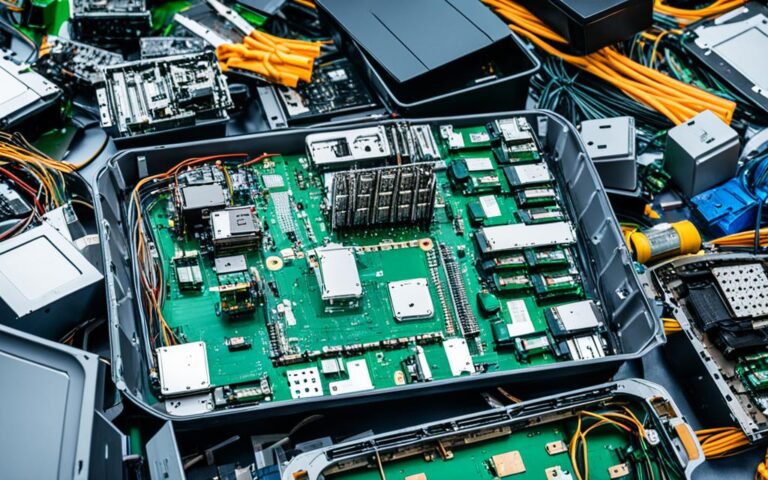The Impact of Server Recycling on Reducing Landfill Waste
Did you know that server recycling can have a significant impact on reducing landfill waste? By responsibly recycling servers, we can help reduce the amount of electronic waste that ends up in landfills, contributing to a greener and more sustainable future.
Electronic waste, also known as e-waste, has detrimental environmental consequences. When not properly disposed of, it can contaminate soil, pollute water sources, and harm wildlife. By recycling servers, we can recover and reuse valuable materials, reducing the need for virgin resources and minimizing the negative impact of mining and manufacturing.
Join the movement towards a cleaner planet by embracing server recycling. Let’s work together to reduce landfill waste and protect the environment for future generations.
The Environmental Cost of IT Waste in Landfills
IT waste in landfills has severe environmental consequences, including soil contamination, water pollution, air pollution, and harm to wildlife. When electronic devices, such as servers, are discarded in landfills, they release hazardous chemicals into the soil. These chemicals, including heavy metals like lead, mercury, and cadmium, are non-biodegradable and can contaminate the soil for years, rendering it unsuitable for agriculture and posing a risk to underground water reserves.
The hazardous substances from the discarded IT equipment can also find their way into water bodies, leading to water pollution and potential harm to aquatic ecosystems. Additionally, the decomposition of organic matter in electronic waste produces harmful gases like methane, contributing to climate change.
The environmental degradation caused by IT waste affects animals near landfills as well, leading to health issues and even death. It is crucial to address these environmental costs and find sustainable solutions to manage IT waste.
Government Regulations and Policies: Guiding Responsible IT Recycling
Government regulations and policies play a crucial role in guiding responsible IT recycling practices. At the federal level, countries like the United States have laws such as the Resource Conservation and Recovery Act (RCRA) that regulate the disposal of hazardous waste, including electronic waste. Individual states and local governments may have their own set of regulations, sometimes stricter than federal guidelines, imposing additional requirements on businesses and individuals.
Certain sectors, such as healthcare and finance, are subject to industry-specific regulations due to the sensitive nature of the data they handle. Various certifications, like e-Stewards or R2 (Responsible Recycling), are recognized by government bodies and indicate that a recycling company follows best practices in IT recycling. Staying informed about upcoming changes and amendments to regulations is essential to comply with new environmental research and technological advancements.
Key Government Regulations and Policies
| Regulation/Policy | Description |
|---|---|
| Resource Conservation and Recovery Act (RCRA) | A federal law in the United States that regulates the disposal of hazardous waste, including electronic waste. |
| State and Local Regulations | Additional regulations imposed by individual states and local governments, which may be stricter than federal guidelines. |
| Industry-Specific Regulations | Regulations that apply to specific sectors, such as healthcare and finance, due to the handling of sensitive data. |
| Certifications (e-Stewards, R2) | Recognized certifications indicating that a recycling company follows best practices in IT recycling. |
By adhering to government regulations and policies, businesses and individuals can ensure responsible disposal of IT waste and contribute to a more sustainable future.
The Role of Recycling Companies: Ensuring Responsible IT Waste Management
Recycling companies play a vital role in ensuring responsible IT waste management. By choosing a certified recycling company, businesses can be confident in their commitment to best practices and compliance with government regulations.
Data security is a primary concern in IT equipment recycling, and reputable recycling companies have robust protocols in place to securely wipe or destroy data. This helps protect against data breaches and ensures compliance with data protection laws.
Additionally, recycling companies prioritize material recovery and reuse. They focus on extracting valuable materials from electronic waste, such as precious metals and rare earth elements, and repurposing them for future use. This not only reduces the demand for virgin resources but also conserves natural resources and minimizes the need for environmentally intensive mining and manufacturing processes.
For materials that cannot be recycled or reused, responsible recycling companies employ eco-friendly disposal methods. These methods ensure compliance with environmental regulations and minimize the overall environmental impact of IT waste disposal.
Transparency and accountability are key aspects of responsible recycling. Recycling companies provide detailed reporting and tracking of the entire recycling process, offering visibility into the handling and disposal of IT waste. These reporting mechanisms are often supported by innovative technologies like blockchain, which enhance transparency and enable traceability throughout the entire recycling journey.
“Recycling turns things into other things. Which is like MAGIC.” – Unknown
Overall, recycling companies play a critical role in the responsible management of IT waste. Their efforts contribute to a more sustainable and circular economy, where valuable resources are recovered and reused, and the negative environmental impacts of electronic waste are minimized.
The Benefits of Choosing Accredited Recycling Companies
Choosing an accredited recycling company offers numerous benefits, such as:
- Assurance of compliance with government regulations
- Secure data destruction to protect against data breaches
- Maximized material recovery and resource conservation
- Minimized environmental impact through eco-friendly disposal methods
- Transparency and accountability through detailed reporting and tracking
By partnering with accredited recycling companies, businesses can demonstrate their commitment to responsible IT waste management while contributing to a more sustainable future.
Comparison of Accredited Recycling Companies
| Company | Accreditations | Data Destruction Methods | Material Recovery Techniques | Environmental Disposal Methods |
|---|---|---|---|---|
| GreenTech Recycling | E-Stewards, R2 | Secure data wiping, physical destruction | Advanced material recovery technologies | Eco-friendly disposal processes |
| EcoRecycle Solutions | ISO 14001, ADISA | Certified data erasure, shredding | Efficient material extraction techniques | Environmentally conscious disposal methods |
| ClearCycle | NAID AAA, e-Stewards | Secure data destruction through degaussing | Optimized material recovery processes | Compliant disposal practices |
Table: Comparison of accredited recycling companies, showcasing their accreditations, data destruction methods, material recovery techniques, and environmental disposal methods.
Partnering with an accredited recycling company ensures that businesses can confidently entrust their IT waste to organizations that prioritize responsible disposal and aim to minimize the environmental impact of electronic waste.
Technological Innovations in IT Recycling: Pioneering a Sustainable Future
Technological innovations are revolutionizing the IT recycling industry, leading to more efficient, accountable, and environmentally sustainable practices. Machine learning and automation are transforming the recycling process, accelerating material recovery and minimizing human error. Blockchain technology provides a trustworthy ecosystem by creating an immutable, transparent ledger of transactions, ensuring responsible handling of materials.
The Internet of Things (IoT) enables real-time monitoring and decision-making, optimizing disposal methods based on data. Virtual Reality (VR) and Augmented Reality (AR) are used for training purposes in recycling facilities, allowing workers to practice best practices. Artificial Intelligence (AI) algorithms analyze large data sets, providing insights for improved recycling practices.
“Technology has opened up new horizons in the IT recycling industry, paving the way towards a sustainable future. By integrating machine learning, blockchain, IoT, VR, AR, and AI, recycling companies are pioneering innovative approaches that prioritize environmental responsibility while maximizing resource recovery.”
Innovative Technologies Shaping IT Recycling
- Machine Learning and Automation: Automation streamlines recycling processes and improves efficiency, ensuring accurate sorting and separation of materials. Machine learning algorithms enhance recycling systems by continuously learning from data, optimizing material recovery rates and reducing waste.
- Blockchain Technology: Blockchain creates a transparent and tamper-proof record of transactions, guaranteeing responsible handling of materials throughout the recycling process. This technology enhances traceability, accountability, and ensures compliance with environmental regulations.
- The Internet of Things (IoT): IoT enables real-time monitoring of recycling operations, facilitating proactive decision-making and efficient resource allocation. IoT sensors track equipment performance, optimize energy consumption, and enable predictive maintenance, resulting in optimized disposal methods.
- Virtual Reality (VR) and Augmented Reality (AR): VR and AR technologies are utilized in recycling facilities for training purposes. Workers can simulate various scenarios, practice best practices, and enhance their skills in a safe and immersive virtual environment.
- Artificial Intelligence (AI): AI algorithms analyze vast amounts of data to identify patterns, optimize processes, and improve recycling practices. By harnessing AI capabilities, recycling companies gain valuable insights for resource allocation, waste reduction, and environmental impact mitigation.
These technological advancements not only improve efficiency and accuracy in IT recycling but also foster a sustainable future by minimizing waste, conserving resources, and reducing environmental harm.
Technological innovations in IT recycling are driving the industry towards a sustainable future, creating new possibilities for responsible waste management and resource recovery. By embracing these innovations, we can pave the way for a greener, more sustainable tomorrow.
Conclusion
Server recycling is a vital step towards reducing landfill waste and mitigating the negative environmental impact of electronic waste. By responsibly disposing of servers, valuable materials can be recovered and reused, reducing the demand for virgin resources and conserving our natural resources.
Government regulations and policies play a crucial role in promoting responsible IT recycling practices. These guidelines ensure that businesses and individuals follow proper disposal methods, protecting the environment and preventing harmful substances from entering our ecosystems.
Recycling companies also play a significant role in ensuring responsible IT waste management. By choosing certified recycling providers, we can ensure that data security is prioritized, and valuable materials are extracted and reused whenever possible. Transparent reporting and tracking systems enable accountability and support the adherence to high recycling standards.
Technological innovations are driving the IT recycling industry towards a more sustainable future. Advancements in machine learning, blockchain, IoT, VR, AR, and AI are transforming recycling processes, accelerating material recovery, enhancing data transparency, and optimizing disposal methods. By embracing server recycling and adopting these sustainable practices, we can contribute to a greener future and protect our environment for generations to come.
FAQ
How does server recycling reduce landfill waste?
Server recycling helps reduce landfill waste by recovering and reusing valuable materials from old servers. This minimizes the need for virgin resources and conserves natural resources.
What are the environmental consequences of IT waste in landfills?
IT waste in landfills can lead to soil contamination, water pollution, air pollution, and harm to wildlife. Hazardous chemicals released by electronic devices, such as servers, can contaminate the soil and water bodies, while the decomposition of organic matter in the waste produces harmful gases.
How do government regulations and policies guide responsible IT recycling?
Government regulations, such as the Resource Conservation and Recovery Act (RCRA), control the disposal of hazardous waste, including electronic waste. These regulations set guidelines for businesses and individuals to follow, with certain sectors having industry-specific regulations. Certifications like e-Stewards or R2 indicate that a recycling company follows best practices in IT recycling.
What role do recycling companies play in IT waste management?
Recycling companies play a vital role in ensuring responsible IT waste management. They choose certified recycling companies to adhere to best practices and comply with government regulations. These companies have protocols in place to securely wipe or destroy data, focus on material recovery and reuse, and employ eco-friendly disposal methods for materials that cannot be recycled.
How do technological innovations contribute to sustainable IT recycling?
Technological innovations revolutionize the IT recycling industry by improving efficiency, accountability, and sustainability. Machine learning and automation accelerate material recovery, while blockchain technology ensures responsible material handling. The Internet of Things (IoT) enables real-time monitoring and decision-making, while Virtual Reality (VR) and Augmented Reality (AR) are used for training purposes in recycling facilities. Artificial Intelligence (AI) algorithms provide insights for improved recycling practices.
What is the conclusion of server recycling in reducing landfill waste?
Embracing server recycling and adopting sustainable practices are essential for reducing landfill waste and protecting the environment. Responsible disposal of servers helps recover valuable materials, conserves natural resources, and reduces the negative environmental impact of electronic waste.

